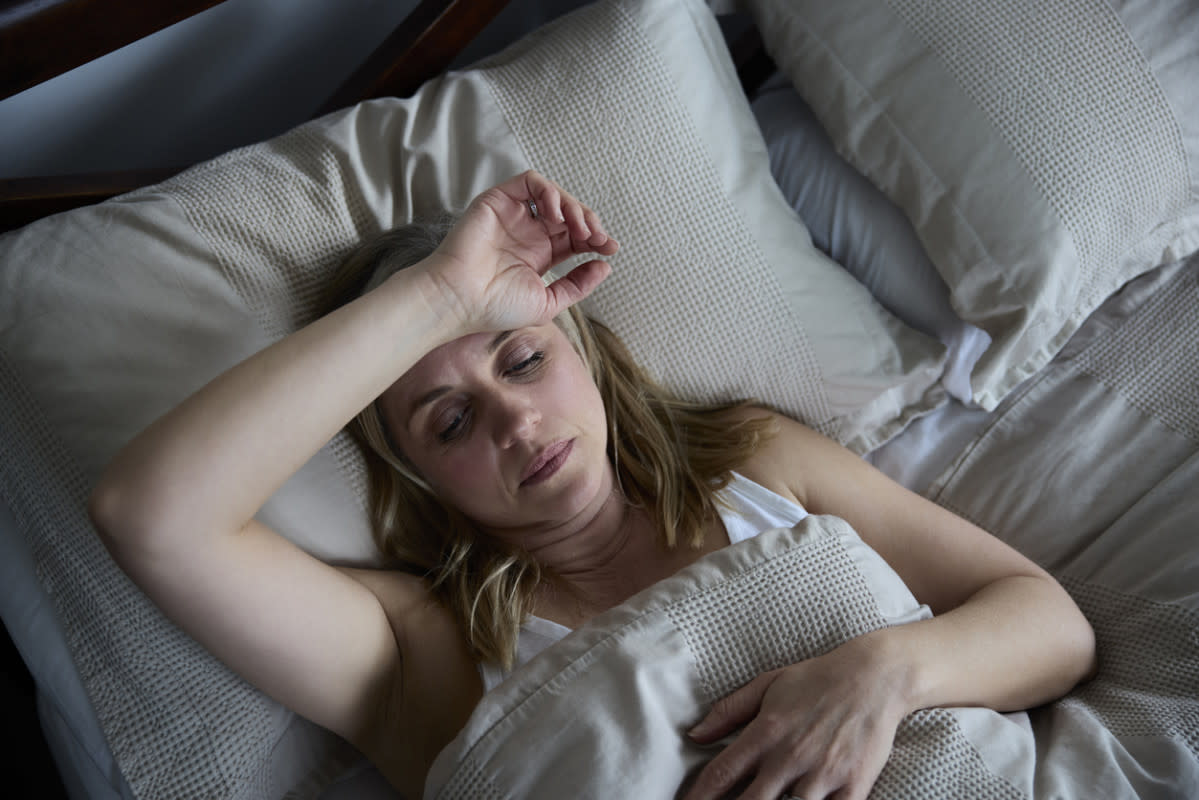So THAT'S Why You Have Such a Hard Time Sleeping as You Get Older

Woman over 50 having trouble sleeping
Experiencing problems falling asleep or staying asleep are, unfortunately, pretty common in the U.S. According to the Centers for Disease Control and Prevention, it’s something 18% of adults experience. Sleep problems are especially common among older adults—20% of adults over age 65 experience sleeping problems compared to 14% of adults between the ages of 18 and 44.
Why are older adults more likely to experience sleep problems than people younger than 45? It turns out that there are several legitimate reasons for this. Fortunately, sleep doctors know exactly what to do about them.
Related: This Is the Most Important Habit To Have if You Want to Get 8 Hours of Sleep Tonight
How Does Aging Impact Sleep?
Sleep medicine doctor and Renuma CEO Dr. David Rosen, MD, explains that it’s natural for someone’s sleep pattern to change over time. “A normal night of sleep keeps changing as we age," he says. "The sleep of a two-year-old looks different than a 20-year-old, which looks different than a 70-year-old. Older adults wake up more frequently during the night and this is considered normal."
According to Dr. Audrey Wells, MD, a sleep medicine physician and founder of Super Sleep, there are several reasons why it’s more common to experience sleeping problems as we get older. First, Dr. Wells explains that the body produces less melatonin as we age, which can lead to both problems falling asleep and staying asleep. Related to this, Dr. Wells says that light sensitivity is lower with age. Pupil size tends to shrink in our 60s, causing the pupils to receive less light than before. “Since light is the primary signal for our circadian rhythm, this signal is reduced,” Dr. Wells says, adding that this can impact circadian rhythm.
Dr. Wells also points out that, especially after retirement, older adults often have less structure in their days than they used to—which in turn can impact sleep. If someone doesn’t wake up or go to bed around the same time every night, this can cause them to not fall asleep as easily. Dr. Wells adds that daytime napping can impact sleep too, making it harder for some people to fall asleep at night.
As we age, Dr. Wells says that experiencing acid reflux, pain or dry mouth are all more common—all of which can in turn impact sleep. She adds that it’s also more common to have to wake up in the middle of the night to use the bathroom.
“Mood issues like depression, anxiety and grief can affect sleep at any age. Older people may experience these more frequently due to changes in living situations, loss of loved ones or health concerns,” Dr. Wells adds as another reason why some older adults have trouble sleeping.
Related: Why You Should Try a 'Coffee Nap'—and Other Surprising Tips on How to Sleep Better
Tips for Sleeping More Soundly
If you wake up periodically throughout the night but can fall back asleep, Dr. Rosen says this change in how you sleep isn’t always an issue. “If you're feeling like you can get through your day without sleepiness posing a problem, then your sleep is probably refreshing enough even if you are waking up frequently,” he explains.
But if the changes in how you sleep are getting in the way of your daily functioning, both doctors say there are several actions you can take that could make a huge difference.
First, both doctors say to stick to a consistent schedule, waking up and going to bed around the same time each day and also avoiding napping. Next, Dr. Rosen says to make sure you’re getting enough sunlight in the morning, ideally outside or at the very least indoors next to a window where sunlight reaches your face. This will help regulate melatonin production.
“Boost activity levels during the day with exercise that increases heart rate and includes strength training, balance and flexibility,” Dr. Wells recommends. She adds that finding ways to challenge yourself mentally—such as through social interactions—also promotes deeper sleep at night.
When it's time to head to bed, Dr. Rosen says to make sure your bedroom is cool. The best temperature for sleep is approximately 65°F.
If you try all of this and are still experiencing sleep problems, both doctors say it can be helpful to see a sleep specialist. A sleep specialist can run tests and evaluate to rule out any underlying health conditions that could be impacting your sleep. They can also come up with recommendations tailored to you as an individual, after pinpointing the reasons for your sleeplessness.
It bears repeating that it’s normal for one’s sleep routine to change over time. If you are waking up throughout the night but don’t feel tired during the day, the changes in your sleeping habits aren’t cause for concern. But if you consistently feel tired throughout the day and find it hard to function, give these tips a try or see a sleep specialist. No one should go through their days too tired to enjoy them!
Next up, here are seven reasons why it's important to get a good night's sleep.
Sources
Dr. David Rosen, MD, sleep medicine doctor and CEO of Renuma
Dr. Audrey Wells, MD, a sleep medicine physician and founder of Super Sleep




